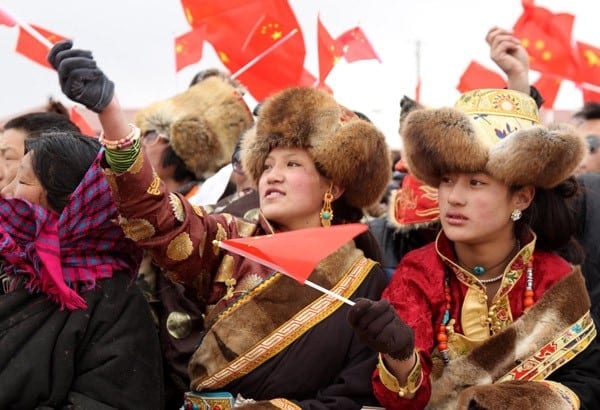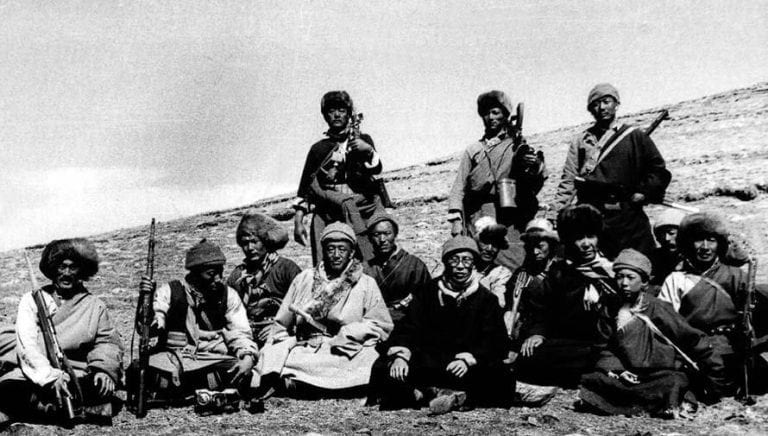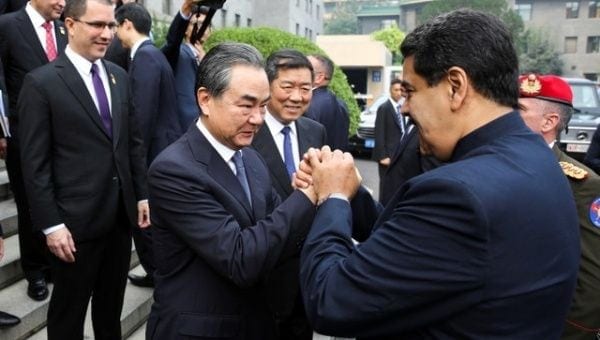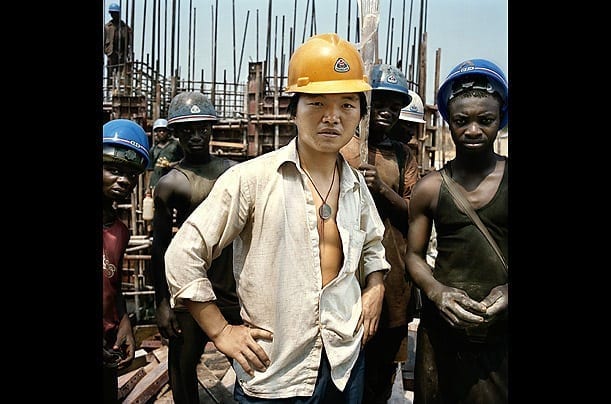The Dalai Lama’s remarks on migrants follow a CIA, Nazi and slavery-linked history
[dropcap]T[/dropcap]his past week the 14th Dalai Lama, Tibet’s 83-year old self-declared spiritual leader in exile, made controversial remarks at a press conference in Malmö recognizing the 80th anniversary of the founding of Individual Humanitarian Aid, a Swedish development and philanthropic assistance program that took in Buddhist refugees after the Chinese annexed Tibet in 1959. His comments came as he addressed the European migrant crisis and his choice of words immediately sparked criticism because they seemed to express an attitude typically shared by the European Union’s far right. With the exception of his detractors, the views he expressed to most were unexpected coming from a monk known for preaching enlightenment and inner peace around the globe. “His Holiness”, AKA Tenzin Gyatso, stated:
“Recently large numbers of refugees, many from the Middle East, have fled to Europe in fear for their lives. They have been given shelter and support, but the long-term solution should include providing training and education, particularly for their children, so they can return to rebuild their own countries when peace has been restored.
I think Europe belongs to the Europeans. … Receive them, help them, educate them … but ultimately they should develop their own country.”
The comments occurred in Sweden on the heels of the country’s own shocking general election results which saw an impressive 18% performance made by the anti-immigrant and right-wing populist party, Sweden Democrats. Their third-place finish took place in the midst of a surge of far right nationalist political gains trending across the EU. Sweden itself has taken in tens of thousands of refugees during the influx of immigration in the last few years, a number which the Sweden Democrats have declared they want to halve and 60% of the public in polls wish to see lowered. Unlike far rightists in Eastern Europe or Greece’s Golden Dawn, the Sweden Democrats are part of a slick and optical re-branding of ultra nationalism that emphasizes Islamophobia over anti-Semitism, with other examples such as Ukip and France’s Front National. This pragmatic approach has not gone unpunished, however, as Viktor Orban of Hungary just saw his country slapped with sanctions by the European Parliament for enacting measures restricting immigration as the clash between anti-globalists and neo-liberal ‘inclusive capitalists’ appears to be escalating.

Hollywood's Richard Gere, an avowed Buddhist, has been one of the most prominent ignorant propagandists for the Dalai Lama.
The remarks upset many of the Dalai Lama’s adoring fans as he knowingly or unwittingly appeared to be dog-whistling to their supporters. Still, this isn’t the first time the Tibetan leader has expressed such views. Along with singing praises for India’s Hindu nationalist Prime Minister Narendra Modi, in 2016 he stated that Germany had “too many refugees” during an interview with Frankfurter Allgemeine Zeitung. In addition to demonstrating an oblivious lack of understanding about the migrant crisis, the 1989 Nobel Peace Prize winner’s statements shocked many of his admirers, especially considering his own status as a refugee residing in India for more than 50 years. To his critics they served as further testimony to a hidden history largely unknown to his naive followers and a summation of his actual nationalist views —after all despite his refugee status, his entire political history has been based around returning to power in Tibet. In the West, he has been given the persona of a ‘simple Buddhist monk’ by the political establishment and Hollywood, cloaking his own past as a theocratic despot who speaks for a dominant class within Tibet that has collaborated with the interests of imperialism against China for more than fifty years.
The political author and critic Michael Parenti has written at length about the oppressive social system that existed in Tibet prior to the Chinese liberation in his 2003 essay Friendly Feudalism: The Tibet Myth. The Dalai (“ocean” in Mongolian) Lamas are believed to be reincarnations of the Buddha of Compassion, or manifestations in a lineage of the Bodhisattva (“enlightenment being”). It was the Mongol invasion of Tibet in the 13th century during the Yuan dynasty where Tibetan Buddhism first spread throughout Asia and for the next six centuries was the state religion of both the Ming and Qing dynasties. Following the disintegration of China’s last imperial dynasty, from 1912-1933 Tibet was an absolute monarchy under his predecessor the 13th Dalai Lama. During his brief tenure as the head of state until he was a mere 24 years old, the 14th Dalai Lama was not a democratically-elected leader but selected by a committee of elite lamas (priests of Tibetan Buddhism) following an extensive search guided by their religious beliefs just like those which preceded him. Under his brief but ultra-wealthy reign, Tibet was a remotely isolated and poor country for the vast majority of its population which mostly consisted of illiterate slaves and serfs who were treated like rental cars by overlords, resembling a Buddhist version of the Gulf State kingdoms more than any peaceful paradise. While presiding over a brutal caste system, the Dalai Lama lived in a 1000-room estate with a personal army at his disposal to hunt down deserters. Parenti writes:
“The theocracy’s religious teachings buttressed its class order. The poor and afflicted were taught that they had brought their troubles upon themselves because of their wicked ways in previous lives. Hence they had to accept the misery of their present existence as a karmic atonement and in anticipation that their lot would improve in their next lifetime. The rich and powerful treated their good fortune as a reward for, and tangible evidence of, virtue in past and present lives.
The Tibetan serfs were something more than superstitious victims, blind to their own oppression. As we have seen, some ran away; others openly resisted, sometimes suffering dire consequences. In feudal Tibet, torture and mutilation — including eye gouging, the pulling out of tongues, hamstringing, and amputation — were favored punishments inflicted upon thieves, and runaway or resistant serfs.”
During the Cold War, interest in Tibetan Buddhism worldwide grew dramatically and so did a mainstream version of it in the West. This was supplied by an idealized and exoticized utopian portrayal of the Himalayas and the country akin to the imaginary ‘Shangri-La’ from the novel Lost Horizon, while Western media agencies promoted the ‘Free Tibet’ cause promoted by movie stars and popular musicians. Buddhism’s appealing teachings have led to the perception by many that it is exempt from the ugly history attributed to other major religions, but as we can see with modern examples such as the persecution of the Rohingya in Myanmar this is untrue— it has been used to justify various forms of oppression (including slavery) throughout its history just like other organized religions. Western buddhism became popularized after the establishment of teaching centers during the New Age movement of the 1970s but most of what people in the West know about Tibet is through its depiction in Hollywood, where he has been courted in the silver screen community by everyone from Martin Scorsese to Richard Gere. At the same time, the source of where Hollywood has pulled its superficial understanding of Tibet is from the 1952 book Seven Years in Tibet authored by Austrian mountain climber Heinrich Harrer which aggrandized the feudal government.
It turns out that Harrer wasn’t just any mountaineer but a member of the Sturmabteilung Nazi paramilitary and an SS officer, even meeting with Adolf Hitler after his expedition team successfully climbed the Eiger North Face in the Swiss Alps. In 1939, Harrer traveled in an expedition to the Himalayas to climb the Nanga Parbat peak, one of the world’s ten highest mountains but he was subsequently interned in India by British troops when the European theatre of WWII broke out. Harrer managed to escape to nearby Tibet where his knowledge of the native language led to a salaried employment in the Tibetan government and role as the Dalai Lama’s personal English tutor — in other words, Kundun’s introduction to the Western-world was through a member of Hitler’s Storm Detachment. After the communist Chinese took over, Harrer returned to Europe to write about his experiences and the book became an international best-seller. In 1997, Hollywood made a film version of his account starring Brad Pitt.
Harrer’s experiences weren’t the only instance of historical encounters between the Nazis and Tibet. During the 1930s, along with the occult European fascists had a bizarre fascination with Asian mysticism. They admired the Tibetan Kingdom with its feudal pecking order and wide-ranging use of torture, mutilation, and the death penalty. In 1938, the Germans led a scientific expedition headed by animal biologist and SS officer Ernst Schafer under the patronage of Heinrich Himmler’s Nazi think tank, the SS Ancestral Heritage Society, which promoted racist pseudo-scientific research. While the voyage happened under the pretext of strategic military purposes against the British, it was also intended to validate Himmler’s racial theory that Aryans of unmixed ancestry had previously settled in the Himalayas. During their investigation, the Germans conducted cranial measurements of human skulls and bones obtained from Tibetan graves with the intent to find evidence supporting Himmler’s ideas that they would be of German ancestry. The Nazi Party’s appropriation of the swastika, a symbol connected to the caste system of Ancient India, was also based on this false idea. Schafer returned with his ‘findings’ just a month prior to the German invasion of Poland in 1939.

[dropcap]O[/dropcap]ne of the Dalai Lama’s biggest talking points has been his supposed “commitment to non-violence.” This apparently does not apply to his own practices, where for years during the Cold War he participated in a covert program of the CIA which personally gave him an annual salary of $180,000 as it promoted the Tibetan independence movement, authorized by the same committee which green-lighted the failed Bay of Pigs invasion of Cuba. Not only did the CIA aid his escape to India, but the program also involved subsidizing a Tibetan guerilla movement based in Nepal waging a violent campaign against the Chinese. The program only ended in 1972 when the Nixon administration opted for détente with China under the foreign policy direction of Henry Kissinger. The Dalai Lama regretfully admitted to this decision in his auto-biography Freedom in Exile, but claimed he didn’t initially know of the agreement made with the CIA that was approved by his brothers . However, he avoided mentioning his presence on the CIA payroll proven by declassified documents and his representatives have denied awareness of it since. The Chinese have long claimed that the Tibetan independence movement was a cause under the influence of foreign powers and it appears by his own admission this is true.
China’s so-called ‘occupation’ of Tibet, while certainly not free of flaws (especially during the Cultural Revolution and Great Leap Forward), nevertheless ended a brutal feudal and theocratic system and began a process of industrialization that continues to this day. Prior to 1959, much of Tibet did not even have running water or electricity, much less modern housing or healthcare. The introduction of non-religious education, reformation of the previous severe tax system, and abolishment of slavery and serfdom has lifted much of Tibet out of deep impoverishment and raised its standard of living. Even if one feels that the Chinese need to be more tolerant of its traditional culture or recognize its right to self-determination, the idea that this process should involve returning absolute authority to the Dalai Lama is self-appointed and not the wishes of most Tibetans. The Chinese to their credit since have given greater autonomy to Tibetans after reforms in the 1970s and to this day Buddhism is still practiced widely by its people and tolerated by the authorities. In fact, each year on March 28 Tibetans widely celebrate a Serfs Emancipation Day holiday to commemorate their liberation from theocracy. Tibet had been unified with China for many centuries and was not an independent state for the majority of its history — not only did the PRC free a slave kingdom from social injustice but from its influence under colonial powers who had used it as a chess piece to undermine China.
“We have about 50% of the world’s wealth but only 6.3% of its population. This disparity is particularly great as between ourselves and the peoples of Asia. In this situation, we cannot fail to be the object of envy and resentment. Our real task in the coming period is to devise a pattern of relationships which will permit us to maintain this position of disparity without positive detriment to our national security. To do so, we will have to dispense with all sentimentality and day-dreaming; and our attention will have to be concentrated everywhere on our immediate national objectives. We need not deceive ourselves that we can afford today the luxury of altruism and world-benefaction.”
Coincidentally, the migrant crisis has occurred alongside the modern equivalent of Kennan’s theory of containment in Obama’s failed “pivot to East Asia” regional strategy. Foreign policy toward East Asia under Obama saw the U.S. accelerate its military presence with aircraft carriers in forward deployment, increased presence of combat troops and naval access surrounding China. The U.S. is desperately trying to halt the rise of China on the global stage with its booming economy — journalist and filmmaker John Pilger’s The Coming War on China is an excellent documentary and cinematic exploration of this topic in what appears to be an increasing drive towards WWIII with Beijing. Just as it did throughout the Cold War with Tibet, U.S. media is also stepping up its propaganda campaign by exaggerating the plight of the Uyghur Muslim Turkic minority by falsely claiming they are being interned in concentration camps by the Chinese government.
The Dalai Lama’s comments have provoked a predictable reaction from the very liberals who have championed his cause as an instance of betrayal of their shared cosmetic values. This is emblematic of the entire political climate since the 2008 financial crash which preceded the migrant crisis that the centrist political establishment has done everything within its power to downplay its inseparable connection. The financial collapse is what opened up political space for new, radical ideas and that included a surge of interest in both far left and far right political organizations which spoke directly to the working class, from Occupy Wall Street to the Tea Party. Liberals continue to express faux-outrage at developments of which their failed policies are responsible, while at the same time offering no alternative or solution except doubling-down on the same empty strategies.
While the Stop the War co-founder Jeremy Corbyn has become the leader of the UK’s Labour Party, democratic socialist Senator Bernie Sanders is the most popular politician in the United States, and the disappointing SYRIZA coalition was elected in Greece, it is the far right which has made the greatest gains in response to the failures of capitalism. In 2016, it saw both the election of Donald Trump in the U.S. who campaigned pledging to build a wall on the Southern border and 17 million Brits voting to leave the European Union. Sadly, it is inevitable that their attempts to save capitalism from itself by restricting immigration and imposing tariffs will prove to be ineffectual as Keynesian economics. The real problem lies not with immigration or the demise of the nation state by globalism, but with increasing global inequality and the free market’s relentless drive to extract wealth and resources through imperial conquest of smaller nations, the actual cause of the migrant crisis.
The political establishment is now fighting for its life as it outright denies the interdependence of failing global markets with the crisis, all the while fear-mongering the public in its efforts to reform capitalism under the phony banner of ‘inclusivity’, even as its very policies fuel the increase in xenophobia scapegoating the immigrants it claims to want to protect. These policies not only include the implementation of economic austerity, but military intervention abroad with support for jihadist-dominated uprisings and its failed ‘War on Terror’ in the Middle East which destabilized the region and fueled the wave of migrants seeking asylum in the EU. Much has been written about the contribution of migration and endless war to the Roman Empire’s collapse — it seems the same cards are in the deck for the United States and its hegemony.

This work is licensed under a Creative Commons Attribution-NonCommercial 4.0 International License.

























